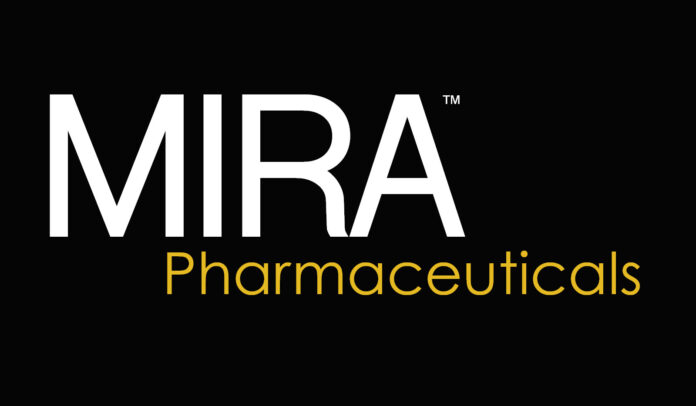BALTIMORE —
MIRA Pharmaceuticals (NASDAQ: MIRA) Initial Public Offering today is accelerating the company’s development of the first synthetic THC prescription drug designed to treat anxiety, pain, and cognition disorders without the unwanted side effects of cannabis or opioids.
The pre-clinical pharmaceutical company’s lead drug candidate is MIRA1a is a synthetic THC analog designed by Johns Hopkins School of Medicine researchers to offer fewer side-effects compared to cannabis.
If approved by the FDA, MIRA1a may be a significant advancement in the treatment of neuropsychiatric, inflammatory, and neurologic diseases and disorders. Based on Pre-clinical studies conducted by MIRA, the company believes that MIRA1a potentially delivers the beneficial effects of THC and CBD without unwanted side effects.
By curbing the negative effects of THC (e.g. cognitive impairment), preclinical studies suggest that MIRA1a may be capable of unmasking positive therapeutic effects not previously seen with THC: cognitive performance enhancement.
An initial focus will be disrupting traditional pharma markets as well as the marijuana analog markets using a safe, effective and, if determined by the FDA, an FDA-approved treatment option. The legal medical marijuana market is a $13.2 billion industry and the legal recreational marijuana market is a $25.6 billion industry. Both are sub-sets of the traditional pain and anxiety markets.
In many patient populations, marijuana may not be the first or a viable option for treatment of neurological disorders. As a result, these patients will typically use non-steroidal anti-inflammatory drugs (NSAIDs) or various mood management drugs, opening them up to a range of non-ideal outcomes.
MIRA Pharmaceuticals CEO Erez Aminov said MIRA1a was designed to offer physicians and patients an FDA-approved, viable synthetic option, and that MIRA’s objective is to commercialize a new fully synthetic treatment options for neuropsychiatric, inflammatory, and neurologic diseases and disorders by selectively targeting the cannabinoid receptors that are involved in a variety of physiological processes and responses including appetite, pain-sensation, mood, and memory.
FULLY SYNTHETIC
MIRA1a is the first synthetic THC analog designed to target the same central nervous system pathway that enables the healthcare benefits of cannabis, but without unwanted side effects such as decreased cognition, increased appetite, memory loss and paranoia that can be associated with Cannabinoids, which are naturally occurring chemical compounds found in cannabis plants and extracts including THC and CBD.
MIRA1a, if approved by FDA, will compete at the intersection of three key markets — anxiety, Central Nervous System/cognitive decline and chronic pain –where multiple products with varying safety and efficacy profiles are already in use. MIRA1a will compete against prescription solutions that affect patients’ central nervous system, a market that encapsulates anxiety, dementia, pain, Alzheimer’s, migraines and related conditions. MIRA estimates that by 2027, the U.S. Central Nervous System market will be worth $48 billion, growing between two and five percent during the period from 2023 to 2027. Within that market opportunity, anxiety is worth between approximately $10 billion and $15 billion in annual sales.
The traditional U.S. pain treatment market is estimated to be worth $42 billion in 2027 and grow between three and six percent during the forecast period. Note that this sizing includes chronic and acute pain, and MIRA1a is likely only to be used in the chronic segment of the market (approximately 40% to 50% of the market).
MIRA Pharmaceuticals was co-founded by Chief Science Officer Dr. Adam Kaplin, whose tenure at John Hopkins University included Principal Neuro-Psychiatric Consultant to the Johns Hopkins Multiple Sclerosis Center of Excellence, Director of the Johns Hopkins Ketamine Clinic and the Departments of Psychiatry & Neurology at Johns Hopkins University School of Medicine.
Mira1a was designed to be classified as a non-scheduled drug, potentially covered by health insurance, as a healthcare provider prescribed alternative to marijuana or opioid treatments for patient anxiety, pain and cognition disorders, but with fewer side-effects compared to cannabis.
ABOUT MIRA Pharmaceuticals, Inc. (Nasdaq: MIRA)
The pre-clinical-stage biopharma company is developing next-generation, unscheduled orally available synthetic THC analog therapies. The company’s lead drug candidate is a novel compound currently under investigation for treating adult patients suffering from anxiety and cognitive decline, often associated with early-stage dementia. MIRA1a if approved by the FDA could mark a significant advancement in addressing various neuropsychiatric, inflammatory, and neurologic diseases and disorders. Based on pre-clinical and animal studies conducted, MIRA1a exhibits a unique capability to enhance the therapeutic potential for treating anxiety, cognitive decline, and chronic pain without the side effects of plant-based THC. Additional information about the Company is available at: www.mirapharmaceuticals.com.








